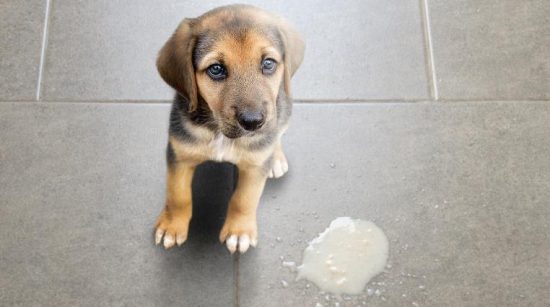Older Cat Stopped Using Litter Box? Try These Tips
Struggling because your older cat stopped using the litter box? Discover effective solutions to address this common issue and restore harmony at home.
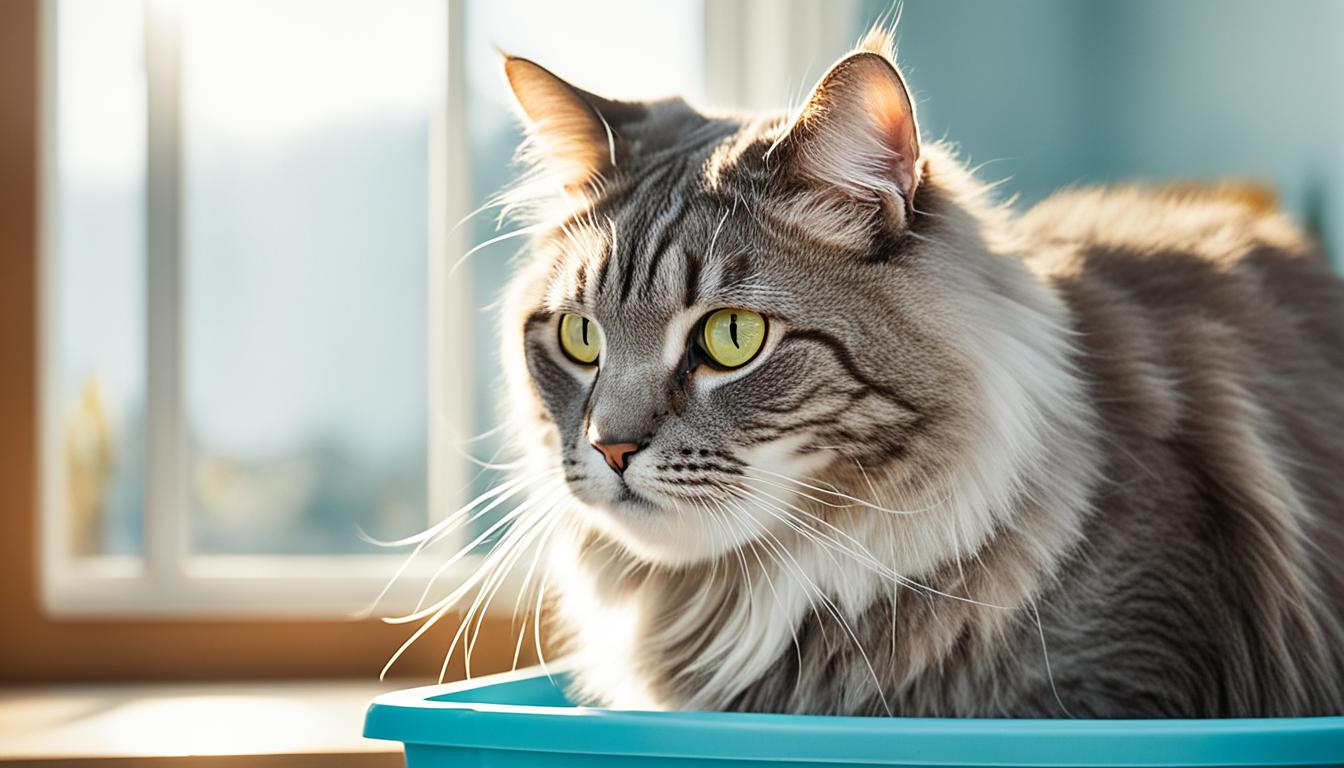
Did you know that approximately 10% of older cats experience litter box issues at some point in their lives? If your older cat stopped using litter box, you’re not alone. This common problem can be a source of frustration and concern for many pet owners. But fear not! There are effective strategies you can employ to help your older cat get back on track with their litter box habits.
Understanding Why Your Senior Cat May Avoid the Litter Box
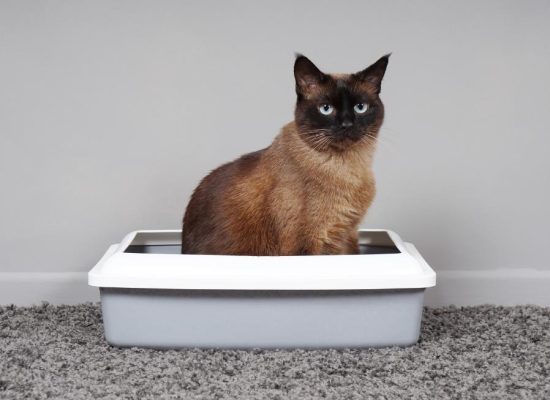
As our beloved cats age, they may experience changes in their behavior, including avoiding the litter box. It can be concerning for cat owners, but understanding the reasons behind this behavior is crucial to addressing the issue effectively.
Identifying Common Medical Issues
Medical issues can significantly impact a senior cat’s litter box use. Some common conditions include:
Urinary tract infections
Senior cats are prone to urinary tract infections (UTIs), which can cause discomfort and pain during urination. This discomfort may lead them to associate the litter box with pain, causing them to avoid it. UTIs can also lead to increased frequency and urgency of urination, making it difficult for them to make it to the litter box in time. Recognizing the signs of a UTI, such as straining to urinate, blood in the urine, or frequent licking of the genital area, is essential for addressing the issue and helping your senior cat feel comfortable using the litter box again.
Arthritis
Arthritis is common in older cats and can make it difficult for them to climb into and out of the litter box, especially if it has high sides. The pain and stiffness associated with arthritis can deter them from using the litter box altogether. Providing a litter box with lower sides or a ramp can help make it more accessible and comfortable for your senior cat. Additionally, managing their arthritis with veterinary-recommended treatments and medications can help reduce their pain and improve their mobility.
Vision problems
As cats age, their vision may deteriorate, leading to difficulties in navigating their environment. Vision problems can make it challenging for senior cats to locate their litter box, particularly if it is moved or in a poorly lit area. Ensuring the litter box is easily accessible, well-lit, and consistently placed in the same location can help your senior cat find and use it more effectively. Regular veterinary check-ups can help monitor and manage any vision issues.
How Age-Related Physical Changes Impact Litter Box Use?
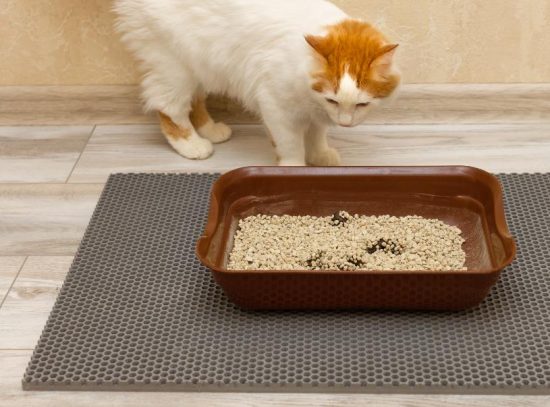
As cats age, they may experience physical changes that affect their litter box behavior. These changes can include:
Decreased mobility
Decreased mobility in senior cats, whether due to age-related muscle weakness, obesity, or other health conditions, can make it harder for them to reach the litter box. Placing litter boxes on each level of your home and ensuring they are easily accessible can help accommodate your cat’s mobility limitations. Providing litter boxes with low entry points and ensuring they are close to your cat’s resting and feeding areas can make it easier for them to use the box regularly.
Joint pain
Joint pain, often associated with conditions like arthritis or hip dysplasia, can make it painful for senior cats to enter and exit the litter box, leading to avoidance. Ensuring that the litter box is easy to access with minimal effort can help reduce this issue. Additionally, providing soft bedding and orthopedic supports in their resting areas can help manage joint pain and improve overall comfort, encouraging them to use the litter box more consistently. Regular veterinary care and appropriate pain management strategies are essential for addressing joint pain in senior cats.
Environmental Stressors and Their Effects on Your Cat
Environmental stressors can also contribute to litter box avoidance in senior cats. Some examples include:
Changes in the household
Senior cats can be particularly sensitive to changes in their environment, and significant alterations in the household can cause stress or anxiety, leading to litter box avoidance. This could include new furniture arrangements, new family members, renovations, or even changes in their daily routine. Such disruptions can make senior cats feel insecure or disoriented, causing them to seek out other, more secluded areas to eliminate. To help your senior cat adjust, try to maintain a consistent environment, gradually introduce any changes, and provide plenty of reassurance and familiar comforts.
Presence of other pets
The introduction or presence of other pets in the household can also lead to litter box avoidance in senior cats. Senior cats may feel threatened or stressed by more active or dominant pets, leading them to avoid shared spaces like the litter box area. Additionally, competition for resources, including litter boxes, can create tension and anxiety. To mitigate this issue, ensure each pet has its own designated litter box, provide multiple litter boxes in different locations, and create a safe, quiet space where your senior cat can access their litter box without interference from other animals.
| Causes of Senior Cat Litter Box Issues | Medical Issues Affecting Litter Box Use | Physical Changes in Aging Cats and Litter Box Behavior | Environmental Stress and Litter Box Avoidance |
|---|---|---|---|
| Urinary tract infections | Arthritis | Decreased mobility | Changes in the household |
| Arthritis | Vision problems | Joint pain | Presence of other pets |
Older Cat Stopped Using Litter Box: Addressing the Root Cause
When to Consult Your Veterinarian
If your older cat has suddenly stopped using the litter box, it is essential to consult with a veterinarian. While occasional accidents can happen, persistent litter box avoidance may be a sign of an underlying medical issue or discomfort that needs to be addressed. Consulting a veterinarian for litter box problems is crucial to rule out any health conditions and determine the best course of action to restore your cat’s litter box habits.
Interpreting Changes in Your Cat’s Behavior and Health
Interpreting changes in your cat’s behavior and health is an essential part of addressing the root cause of senior cat litter box issues. As a pet owner, it’s important to monitor any changes in your cat’s behavior, including increased vocalization, decreased appetite, or excessive grooming. These changes may indicate underlying medical conditions or discomfort that can contribute to litter box avoidance. Additionally, observing changes in your cat’s litter box habits, such as frequent accidents or straining to urinate, can provide valuable clues about their health. By paying close attention to your cat’s behavior and health, you can help your veterinarian in diagnosing and treating the underlying cause of their litter box issues.
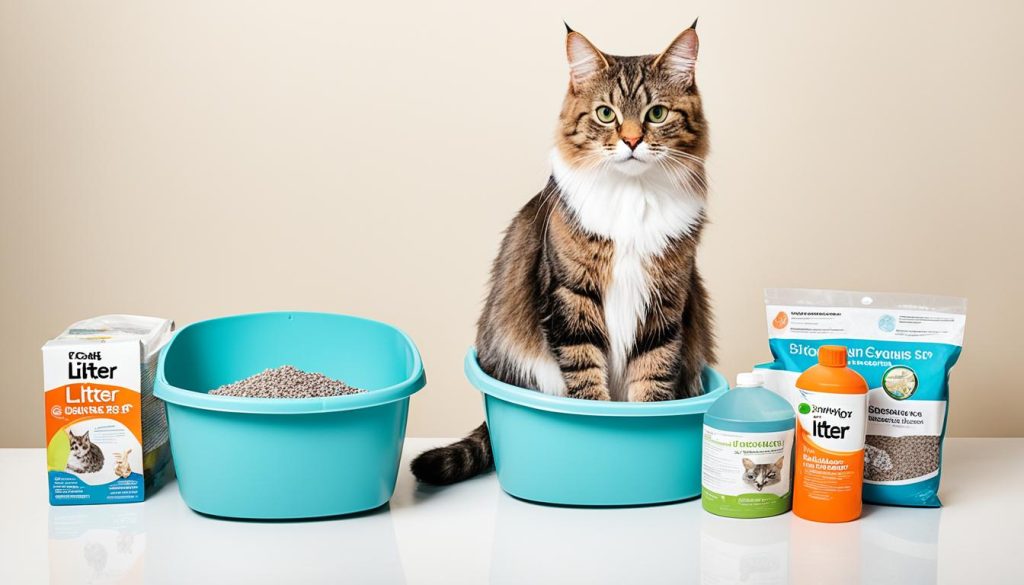
In the next section, we will discuss how to optimize your home for senior cat litter box habits, including choosing the right litter box design, finding cat-friendly litter options, and strategic litter box placement. By addressing the root cause and creating a suitable environment for your older cat, you can help them regain their litter box confidence and ensure their well-being.
How Do I Get My Older Cat to Use the Litter Box Again?
Encouraging your older cat to use the litter box again requires a combination of modifications to the litter box environment, proper diet and hydration, and behavior modification techniques. By implementing these strategies, you can help your aging feline regain their litter box habits and maintain a clean and comfortable living space.
Modifying the Litter Box Environment to Suit Aging Cats
As cats age, they may experience physical changes that can affect their ability to use the litter box. To accommodate their needs:
- Choose a litter box with low sides for easy entry and exit.
- Place additional litter boxes throughout your home to ensure easy accessibility.
- Consider using a litter box with a ramp or steps to assist cats with reduced mobility.
- Provide a litter box with a larger surface area to accommodate cats with arthritis or joint pain.
Diet and Hydration: Their Role in Litter Box Usage
An appropriate diet and adequate hydration can play a significant role in your cat’s litter box habits:
- Ensure your cat has access to fresh water at all times.
- Choose a high-quality, age-appropriate cat food that promotes urinary health.
- Offer wet food or increase moisture intake to prevent dehydration and promote urine production.
Harnessing the Power of Cat Behavior Modification Techniques
Behavior modification techniques can help reinforce positive litter box habits in your cat:
- Use positive reinforcement, such as treats or praise, when your cat uses the litter box correctly.
- Create a positive association with the litter box by placing treats or toys near it.
- Ensure the litter box is clean and odor-free to encourage your cat to use it.
- Consult with a veterinarian or animal behaviorist for guidance on specific behavior modification techniques.
| Strategy | Instructions |
|---|---|
| Choose a litter box design suitable for aging cats | Select a litter box with low sides, larger surface area, and a ramp or steps for easy access. |
| Ensure proper diet and hydration | Provide fresh water, choose high-quality cat food, and offer wet food or increase moisture intake. |
| Implement behavior modification techniques | Use positive reinforcement, create a positive association with the litter box, and maintain cleanliness. |
Maintaining Cleanliness and Comfort for Your Aging Feline
As your cat ages, it becomes increasingly important to maintain a clean and comfortable environment for them. The cleanliness of the litter box is crucial in encouraging your senior cat to use it regularly. To maintain cleanliness, make sure to scoop the litter box at least once a day and change the litter completely every week. This will help eliminate odor and provide a clean space for your cat to use.
In addition to cleanliness, creating a comfortable environment for your aging cat is essential. Provide cozy resting spots throughout your home, such as soft beds or warm blankets, where your cat can relax and feel secure. Senior cats may also benefit from elevated platforms or ramps to help them access their favorite spots with ease.
Minimizing stressors in the household is another way to ensure your older cat’s comfort. Keep their litter box in a quiet and secluded area, away from high-traffic zones or loud noises. Additionally, try to maintain a consistent daily routine for your cat, including regular feeding times and play sessions. This stability can help reduce stress and promote a sense of security.
FAQs on older cat stopped using litter box
How do I get my older cat to use the litter box again?
There are several tips and strategies you can try to encourage your older cat to use the litter box again. Understanding the reasons behind their litter box avoidance is crucial. You should consider any potential medical issues and consult your veterinarian if necessary. Optimizing your home for senior cat litter box habits is also important. This includes choosing the right litter box design, finding the best litter formula, and strategic litter box placement.
Why did my cat suddenly stop using the litter box?
There are various reasons why your cat might suddenly stop using the litter box. It could be due to medical issues, such as urinary tract infections or arthritis. Age-related physical changes, decreased mobility, and joint pain can also impact their ability to use the litter box.
Why is my senior cat suddenly pooping outside the litter box?
Senior cats may start pooping outside the litter box due to various reasons. Common medical issues, such as urinary tract infections or arthritis, can contribute to this behavior. Age-related physical changes like decreased mobility and joint pain can also hinder their litter box usage. Environmental stressors, such as changes at home or the presence of other pets, may further contribute to litter box avoidance. It’s important to identify the underlying cause to address this problem.
How to punish a cat for pooping outside the litter box?
It’s important to note that punishment is not an effective way to address litter box issues in cats. Punishing your cat for pooping outside the litter box can create fear and anxiety, which can worsen the problem. Instead, focus on identifying and addressing the underlying cause. Consult your veterinarian to rule out any medical issues, optimize the litter box environment, and implement behavior modification techniques to encourage your cat to use the litter box again.


